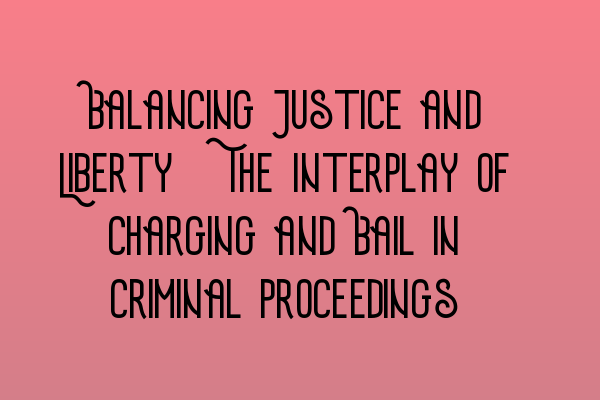Balancing Justice and Liberty: The Interplay of Charging and Bail in Criminal Proceedings
Welcome to the SQE Criminal Law & Practice Law UK blog, where we explore various aspects of criminal proceedings from a legal standpoint. In this article, we delve into the intricate relationship between charging decisions and bail in criminal cases. Balancing justice and personal liberty is crucial, and understanding the complexities involved is essential for both legal professionals and those interested in criminal law.
Charging Decisions
When a person is suspected of committing a crime, the police conduct an investigation to collect evidence and establish whether there is sufficient evidence to charge the individual. This decision to charge rests on several factors, including the strength of the evidence, public interest, and the likelihood of a successful prosecution.
It is important to note that the decision to charge is not a determination of guilt. Rather, it is the formal step that initiates the criminal proceedings. The charging decision plays a pivotal role in the balance between justice and liberty. On one hand, it is essential to protect the rights of the accused and ensure fair treatment. On the other hand, it is imperative to safeguard society by efficiently prosecuting those suspected of criminal activities.
Once the charging decision has been made, the next consideration is whether the accused should be granted bail or remanded into custody pending trial.
Bail in Criminal Proceedings
Bail refers to the temporary release of an accused person from custody with certain conditions. The purpose of granting bail is to strike a balance between upholding the presumption of innocence and ensuring the safety of the public.
The granting of bail depends on various factors, including the seriousness of the offense, the likelihood of the accused attending court, and the potential risk of harm to the public. The court carefully considers these factors and imposes conditions that the accused must comply with while on bail, such as reporting to a local police station regularly, surrendering their passport, or refraining from contacting certain individuals.
It is crucial to evaluate the potential risks associated with granting bail. In cases where there is a significant risk of the accused endangering the public, interfering with witnesses, or absconding, the court may decide to refuse bail and remand the individual into custody until trial.
Furthermore, the recent SQE reforms have emphasized the importance of legal professionals having a comprehensive understanding of bail procedures and the factors considered by the court when making bail decisions. To prepare for the solicitors qualifying examination, it is highly recommended to take advantage of SQE 1 Preparation Courses.
The Interplay of Charging and Bail
The interplay of charging decisions and bail in criminal proceedings is complex. Charging decisions directly influence the subsequent bail hearing. In cases where the evidence supporting the charges is weak, the accused is more likely to be granted bail. However, if the charges are serious and supported by strong evidence, the court may be less inclined to grant bail due to the potential risk posed to the public or the probability of the accused not attending the court proceedings.
It is important for legal professionals to establish a strong argument for bail, highlighting factors such as the accused’s ties to the community, previous compliance with bail conditions in other cases, and any potential mitigating factors that may favor their release. This requires extensive legal knowledge and expert representation, which can be acquired through SQE 2 Preparation Courses.
In conclusion, the delicate balance between justice and personal liberty in criminal proceedings is maintained through the careful interplay of charging decisions and bail. Balancing the rights of the accused with the protection of the public is crucial in ensuring a fair and efficient criminal justice system. By understanding the complexities involved in charging and bail decisions, legal professionals can effectively navigate through criminal proceedings while upholding the principles of justice.
If you’re interested in further exploring criminal law topics, we recommend checking out our related articles:
- SQE 1 Practice Exam Questions
- SQE 1 Practice Mocks FLK1 FLK2
- SQE 2 Preparation Courses
- SQE 1 Preparation Courses
- SRA SQE Exam Dates
Thank you for reading our blog post! If you have any questions or would like to learn more about criminal law, please feel free to contact our team at SQE Criminal Law & Practice Law UK.
